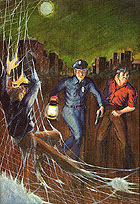The following posts include (1) "footnotes" for The Doris Piserchia Website (link at left), (2) texts-in-process that will eventually appear there, (3) texts from other websites, and (we hope) (4) stimulating discussion threads. The picture to the left is the back cover of The Spinner (book club edition), depicting a citizen of Eastland "hanging out" while Ekler the cop and Rune the idiot-superman look on.
View current page
...more recent posts
Earth In Twilight is the prototypical Doris Piserchia book. It has that weird woman-trying-to-sound-like-a-guy style that went with the turf of writing in the Bad old days of the Boys Club, along with a love of scene that sometimes threatens to overwhelm the narrative. It is a reverse Garden of Eden story, in the fabulous Jungle that Earth has become in the evening of its existence. The humans are gone to the stars, and the weird polyglot fauna that has evolved from the cast off remains of questionable genetic tinkering rule a dense green thicket where once walked Man. It is a bit like the Gene Wolfe Torturer world without the people, or Vance's Dying Earth without the magic. It is distantly reminiscent of Neal Barrett's Aldair world, a more primitive genetic funhouse where the weirdly evolved organisms live without the Myths of humankind. Earth has become a greenery-choked planet inhabited by Strange Creatures who are the accidental Frankensteins of Old Earth's biological tinkering. Earth-descended humans who have been raiding its genome have decided to defoliate the wreckage and make the planet once again a habitable and useful place, and have dispatched a small team to lay the groundwork for a massive chemical weed whacking. The survivor discovers Civilization happening among the strange fruit of a world buried under miles of vines and vegetation, and the race is on to avert a planetary Apocalypse.
The narrative moves interestingly between the points of view of the Spacer and the various indigenous organisms he encounters. Monsters reveal their beauty and whimsy, and the children of earth show the Outsider that his views of habitability and society are narrow and in need of renovation. If there is a major weakness of Earth In Twilight, it is a lack of seriousness in the narrative that might have allowed Piserchia to study more deeply some of the profundities her Twilight world opens up. The forced breeziness of the writing is just a bit too wacky at times, considering the genocidal fate that awaits. Where the book shines is in its evocation of a world transformed, and in its delineation of the lives, both inner and outer, of its strange creatures. Piserchia is a genius of setting, with a love for the complex and baroque that sometimes edges over into too much, but more often gently draws the reader In. She doesn't feel the need to throw in the often unbelievable and sometimes stupid and excessive hard sci fi Tech that writers of her generation so often pound readers over the head with, a refreshing thing that allows the reader to focus on the story and characters. Piserchia is that rare science fiction writer who can crank out a good tale without a lot of the conventional gimmickry associated with books of this era (and, for that matter, ours).
Is it a Dying Earth story? Hard to say, but probably not, at least in the conventional sense of the term. It is an Earth at the end of History, a twilight place long abandoned by Man, but one has the feeling that the Earth is getting along just fine without us, thank you very much. It might be called an Environmental Twilight Earth story, which abandons the human-centric Dying Earth idea for something a little more inclusive of all the things which are not-Man. For, for all we know, the era of Man may just be a setup for the great Cockroach Empire that will sweep through the galaxy and humble our puny relics of Civilization. The Earth will live on, and our imaginings of its Dying are merely our fear of the inevitable fate of our species and the end of our History.
--from Strange Words
